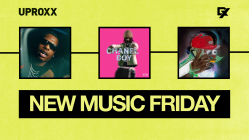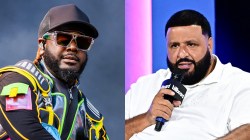The rules of Hip Hop are always subject to change, and heading into 2015 lyrical skill continues to take somewhat of a back seat. With the capacity to appear larger than life factoring more heavily towards success, stardom has become predicated on creating compelling scenes that capture a moment. Brooklyn’s GS9 crew has pulled this feat off in spades with the breakout success of Bobby Shmurda. A household name almost out of thin air, his visibility through YouTube, Vine, Tumblr and other arenas of online exposure indicate the youth’s ability to shape and mold culture, making him the only sensible option for closing this year’s BET Hip Hop Awards ceremony. Striking while the iron is hot (no pun intended), Epic Records attempts to capitalize on Bobby’s deafening buzz, bold presence and star power with Shmurda She Wrote.
Happily trading his block for bright lights, Bobby Shmurda has basked in the endless discussion and criticism surrounding his name for the past two seasons. The ongoing debate stems from his swift rise making him both an instant meme and a (perhaps momentary) hitmaker, with spectators torn as to whether or not he’s a flash in the pan gimmick. This summer’s video for “Computers” featured Bobby’s trademark spastic live motion accompanied by simplistic, catchy lines like “I’m sliding over cars when I shoot / I think that I’m Tom Cruise,” leaving viewers intrigued at the prospect of him flourishing on a debut. With its formal arrival, Shmurda She Wrote is a brief glimpse into the life of a riled up adolescent trying to make the most of his big moment while not far removed from the hazardous trappings that made him a star, six seconds at a time.
The EP opens with “World Wide Nigga,” where Bobby drops a monologue explaining how he’s gone from petty skirmishes to a global brand extending as far as Dubai. The song shows the pride he places in street credibility, the same attribute that brought him prosperity on the ubiquitous and lazily titled “Hot Nigga.” Without much regard for song structure, the now infamous long verse salutes comrades who tote pistols for protection amidst the drug trade and calls for other friends (and Shmurda’s father) to be released from behind bars. By luck and happenstance, Lloyd Banks’ “Jackpot” (where the production for “Hot Nigga” was originally used) fell flat, giving an opportunity for Bobby’s ingenious flow and shmoney dance to dominate this past summer.
Bobby Shmurda’s primary challenge and goal has been getting lightning to strike twice. Skeptics were bemused by his quick rise while supporters were eager for another smash single, with curiosities indulged by the hopeful follow-up “Bobby Bitch.” Despite the amusing footwork found in its three minute short film and the catchy use of repetition in his verses, the young shooter has met a comparably lukewarm reception on this second try. Speeding up the same rhyme pattern on “Living Life,” his lack of experimentation falls short but his partner in crime Rowdy Rebel contributes something of interest with awkward pronunciations giving vocal reminders of Chief Keef (a likely inspiration to anyone coming of age in the era of viral sensations).
Shmurda She Wrote winds down with “Wipe The Case Away,” likely based on Bobby Shmurda’s true to life blunders and issues within the legal system including his June arrest for weapon possession. Here he makes his most ill-advised creative decisions, feigning innocence while crooning through auto-tune and seeking empathy with the grammatical faux pas, “We was in the courthouse, oftenly.” The product of East Flatbush is coasting comfortably with his finger on the pulse of what moves people for now, and Bobby’s theatrics have breathed life into New York Hip Hop, but while his minimalist approach has gone appreciated, his long-term sustainability is subject to questioning. Likened by hesitant commentators to the short lived spectacle that was Trinidad James’ big moment, Bobby’s music seeks to eliminate challenges from opposing crews and police, but the biggest threat he may potentially face is the backlash from a lack of further artistic development.










It’s Shmuuuuurdaaaaaaa! B Schmuuuuurdaaaaaaa!
WORLDWIDE NIGGA!!!
Trash.
this is the lil brother of Ja Rule?
looooooooooooooooooooool
gonna sell 5k 1st week lool
omg what a bullshit
A SHMINSTREL show right here
good one.. actually made me laugh!
well played.
who wanna suck this white cock u niikkkkerrrs
Right here, you gotta put it in my tight shithole first
you are obsessed with black people. typical for you and your kind.
Hot Garbage.
ASHSDAKFADJKKALALLL
they should call duke Bobby ButtCheeks
the music is straight ass
That fact that ya’ll gave him 3 stars shows that this site is far from “Hip Hop”… SMMFH
bobby shmurda got the face of a dirty cockroach that been watin to come out from under the fridge for 3 years
you are such an idiot.
no need to make such statements
hey, would you have felt better if he said that he looks pretty?
not even a one hit wonder…
you wouldnt hear about this fool next year this time, just another Gimmick
agreed
this album should be called shmurda HE wrote not shmurda SHE wrote
Yeah lol
good point
Same thing I thought. But, this kid is retarded, don’t forget.
nah
dx – tons of rappers record songs with grammatical faux pas – you really have the need to mention this in your review of the album. if you are going to do it here, be consistent. Jay-Z barely knows how to spit a verse minus grammatical faux pas
rip nyc
he’ll be an afterthought in 3 years
lol @ this review acting like he’s Kanye or something
How anyone gives this trash beyond 1 star is fucking amazing.
Bobby Buttcheeks…..Bobby..Bobby…Bobby Buttcheeks…They gon play my shitty song….7 days a week
nyc is da greatest city on da planet earth.
No, NYC is starting to become a breeding ground for some of the wackest mc to date.French Montana, Bobby Shmurda,Tony Yayo. Too many NYC MCs dickriding the South’s sound. Hell,even jigga has been doing it…NYC need to rethink their sounds and bring NYC back to the forefront of hip hop.
I’ve lived in NYC all my life, and have followed hip-hop for a long time. It’s true, there are a lot of NY rappers faking southern accents to sell records, there is no doubt about that; however, there are some true-blue NY rappers who remain true to the sound of New York.
Another in the long line of trendy rappers that won’t last.
This kids sucks. I don’t care what anybody says. Flash in the pan or not, this kid sucks. Sounds like everyone else.
more disposable trash
Free shmurda